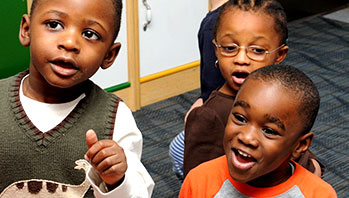- chart paper
- marker
- worm
MA Standards:
English Language Arts/Foundational Skills/RF.PK.MA.1: With guidance and support, demonstrate understanding of the organization and basic features of printed and written text: books, words, letters, and the alphabet.
English Language Arts/Speaking and Listening/SL.PK.MA.1a: Observe and use appropriate ways of interacting in a group (e.g. taking turns in talking, listening to peers, waiting to speak until another person is finished talking, asking questions and waiting for an answer, gaining the floor in appropriate ways).
Head Start Outcomes:
Social Emotional Development/Self-Regulation: Follows simple rules, routines, and directions.
Language Development/Receptive Language: Attends to language during conversations, songs, stories, or other learning experiences.
Literacy Knowledge/Print Concepts and Conventions: Understands conventions, such as print moves from left to right and top to bottom of a page.
Literacy Knowledge/Early Writing: Recognizes that writing is a way of communicating for a variety of purposes, such as giving information, sharing stories, or giving an opinion.
PreK Learning Guidelines:
English Language Arts/Language 1: Observe and use appropriate ways of interacting in a group (taking turns in talking; listening to peers; waiting until someone is finished; asking questions and waiting for an answer; gaining the floor in appropriate ways).
English Language Arts/Reading and Literature 12: Listen to, recite, sing, and dramatize a variety of age-appropriate literature.
Recite Together: “Wiggle, Wiggle”

© Commonwealth of Massachusetts, Department of Early Education and Care (Jennifer Waddell photographer). All rights reserved.
STEM Key Concepts: Earthworms are animals that live in the soil, underground
ELA Focus Skills: Concepts of Print (Directionality, Return Sweep), Letter Recognition, Phonological Awareness (Rhythm, Rhyme, and Repetition), Vocabulary, Word Recognition
Educator Prep: Write the words to the poem on chart paper before beginning the activity.
Show children the poem “Wiggle, Wiggle.” Point to each word as you read the title of the poem aloud. Say, Let me see you wiggle like worms! Tell children that the poem is about how worms hide to stay safe from their foe.
- Recite the poem. Move your finger under the words, exaggerating slightly the return sweep of your hand to the beginning of the next line.
- After reciting ask questions such as, Why do you think worms need to hide from their foes? (to stay safe) From the sun? (to keep their skin wet)
- Display the worms word card. Say, This is the word worms. Ask, What letter does the word worms start with? Who can find the word worms on the poem chart?
- Display the letter “Ww” card and ask children to identify the letter. Ask, Who can find the uppercase letter “W” on the poem chart? Who can find the lowercase letter “w”?
- Invite volunteers to come up to the chart to touch and name any other letters that they recognize.
- Recite the poem with children and have them wiggle as they recite.
Wiggle, Wiggle
Wiggle, wiggle, little worms
How I like to watch you squirm.
Down your hole you quickly go
Safely hiding from your foe.
Wiggle, wiggle, little worms
How I like to watch you squirm.
Down your hole you quickly run
Safely hiding from the sun.
Adaptation: For very young children, watch the video one day and teach the poem another.
